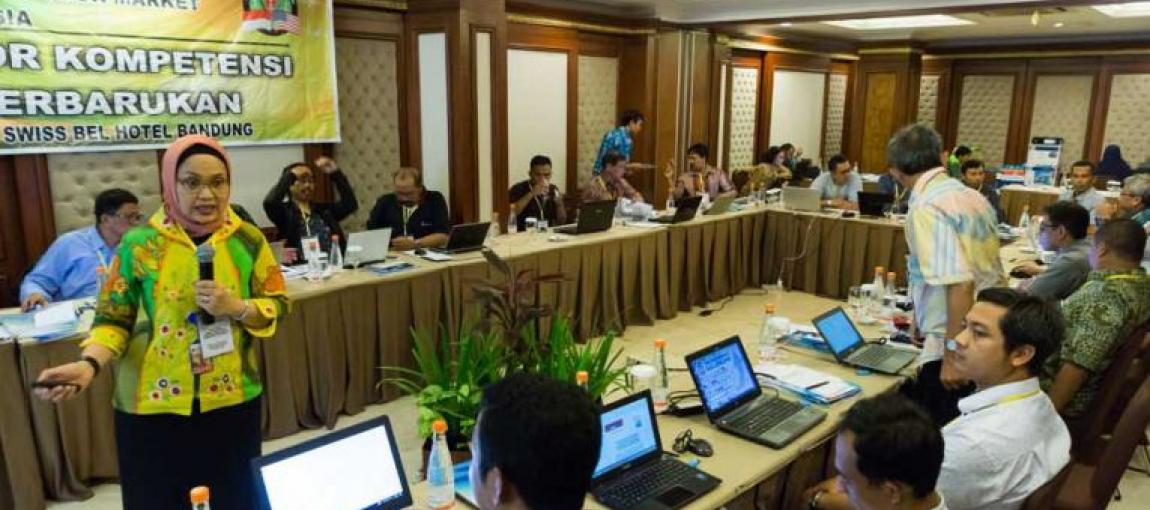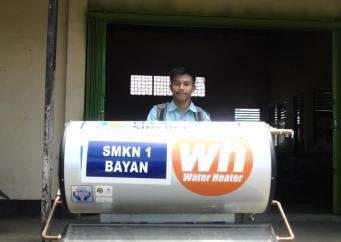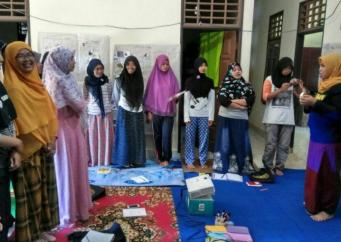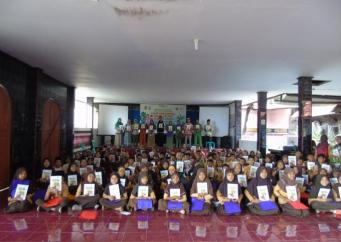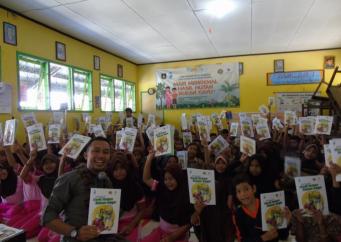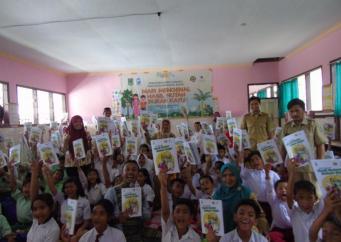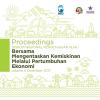Peka Sinergi Conducts First Training for Competency Assessors in Renewable Energy Job Skills
PEKA SINERGI organized a training and certification for 25 candidates to become competency assessors for jobs skills in the renewable energy (RE) sector. The event took place from 19 - 24 December in Bandung and was coordinated by TEDC Bandung in partnership with the Professional Certification Institution for Renewable Energy (Lembaga Sertifikasi Profesi – Energi Terbarukan– LSP ET). This RE competency assessor training was the first of its kind for Indonesia and forms a key component of PEKA SINERGI’s programme to develop and standardize skills training and certification for Indonesia’s renewable energy sector.
With current national policy targeting increased use of renewables, skills development in the sector has become a priority for government and private sector initiatives. Participants selected for the six-day training came from the Directorate General of New, Renewable Energy and Energy Conservation, PEKA SINERGI’s implementing partners TEDC Bandung and the University of Mataram, and from renewable energy associations active in Jakarta and Bandung. The training aimed to equip the candidates with the knowledge and skills to conduct certification examinations based on recently developed competency standards for renewable energy skills in nine technologies: solar, hydro, wind, biomass power, gasification, palm oil mill effluent, bioethanol, biodiesel and biogas.

The RET Assessor training was delivered by master assessors provided by the National Professional Certification Board (Badan Nasional Sertifikasi Profesi – BNSP) through a combination of lectures, assignments and exercises. On the final day, BNSP examiners implemented formal assessment in which all candidates were supervised while conducting practice one-on-one assessments. As a result of the examination, all 25 participants were judged as 'competent' and are qualified for further training under PEKA SINERGI’s programme.
Key aspects of competence-based assessment:
- Competencies are a set of knowledge, skills and attitudes conforming to a certain professional standard -- being knowledgeable alone is not sufficient. To become a professional assessor, one should prove consistent attitude and objectivity.
- In the assessment process, an assessor judges the assessee’s competence against a certification scheme and standard competency units
- An assessor is not only tasked with running a professional assessment, but also with providing clear guidance and direction to the assessee so that they can demonstrate maximum competence on a unit or multiple units during competency testing
This six-day training in Arion Swissbel Hotel Bandung, even it tight, technical and comprehensive, has been delivered in attractive and interactive manner by the two prominent female master assessors from BNSP, Dr. Tini Agustini Merawati and Tri Darawanti Roesfian (Anti), SSTPar, LCPC.
Key learning materials include:
- National Certification System
- Planning and Organising Assessment
- Identifying Assessment Approach
- Developing Assessment Tool
- Practicing Competency Assessment
Not only an assesor is required to master the knowledge, he/she is required to be computer literate due to certification process that is now developed fully computerised. Beside completeness as notable aspect, this point on computer literacy was raised as notable emphasis by the Kabid Fastingkom in the opening remark.
Training deliveries:
- lecture
- role play on one unit competency using observation method combined with oral and written test.
- Individual assignment and pair assignment for other competency unit using portfolio verification exercise and pair interview.
- Preparation to ACA (Assessment of Candidate Assessor)
When the participant is recommended “competent”, he/she can proceed to the ACA concluding session.
Assessment of Candidate Assesor and further Full Session
The concluding session ACA is the key highlight of the entire training. The session became the much awaited participant to stay to the end of the training. The session conducted a real assessment in a pair involving the participants as candidate assessors assessing technical practitioners specially brought from external into the training. The one-on-one session has brought the total participants to become 50 people on the last day.
This assessment skill is the key point for earning “competent” recommendation. Those who passed this session will obtain certificate of “competent” candidate assessor that can be used to pursue next Full Assessment round. Two BNSP master assessors Mr. Susilo Prawirohartono dan Mr Soeryahadi supervised this final session.
To become a Full Assessor, the graduate participants will have to undergo final assessment known as Adequacy Audit as part of the Full Assessment. The steps include:
- Real Assessment
- Witness Assessment
As mentioned, each participant has to earn pre “competent” certification from LSP-ET before they can take Full Assessment. In the absence of this certificate due to doubted competency, the participant has to undergo Competency Test directly with BNSP in order to seek the certificate of “competent” before proceeding into Full Assessment organised by BNSP.

Witness Assessment is a tripartite session involving candidate assessor, LSP-ET as an issuing body, and master assessor acted as witness from BNSP side. Later, BNSP issues competency certificate to the assessee when proven qualified. This arrangement guarantees validity as well as objectivity of the examination process.
**these note assessments are covered in the Candidate Assessor Training. They are provided separately by BNSP.
Challenges
The main challenges of practitioners –as they are predominantly working with facilities in their day-to-day practice- is the lacking skill with writing a systematic document. They are less eloquent in well documenting process and in conveying oral transfer knowledge. The training is therefore emphasized to improve this aspect in order to prepare qualified assessors.
Women representation
From the total 25 participants who predominantly male -common in the more technology-based environment-, two (2) female participants (equals to 8%) from biodiesel participated the training.
They actively involved in sessions both in lecture or group exercise. The representation of two female participants as well as two master assessors demonstrates an encouraging gender practice within the scheme of Peka Sinergi project. In the future, TEDC is expected to encourage more women participation in the training.
Benchmark Scheme
Actually, there has only been limited similar system implemented by a number of advanced countries. As a benchmark, TEDC as part of Peka Sinergi project, has adopted and developed model using only relevant reference to be implemented in Indonesia.
**Predating just before the training, the team received a good news on 13 December 2016 in regards with the issuance of approval from Ministry of Manpower on scheme of Standard Professional Competency Specific on RET. It thus proves that Peka Sinergi scheme has now been legitimate to become official system in Indonesia. Those who are involved in the project should be proud with this milestone achievement.
As for the upcoming training, 2nd and 3rd batch training are scheduled in January and February 2017. The learning material and method that are going to be delivered in the training is the similar with the first batch. The only difference will be the new 25 participants on each training. At the end of 3rd training It is projected, there will be 75 people will have been trained and this is realising target by Peka Sinergi project. Let’s wait to hear interesting stories from this next training rosters.
Training feedback
Training materials which complicated, tight, yet comprehensive is found hard for the most participants. It is inevitable due to they should comply with BNSP tight process and procedures. However with enthusiams and high spirit, participants have dealt it with working hand in hand, seriously exercise the finale ACA until late at night. At the end of the session, all participants passed ACA, granted “competent” recommendation, and thus are all eligible to pursue Competency Assessor Certificate through Real and Witness Assessments.
The organiser was highly commended as professional and responsive following people satisfaction reflected from evaluation questionaires.
An inspiring story from a Geothermal practitioner participant
DR. Ir. Prijo Hutomo, MM was the participant representing Indonesia Geothermal Association. He successfully participated the training since the beginning until the end. Unfortunately, his health condition has deteriorated on the last day. With high spirit and intent to benefiting the training in mind, he flew to seek immediate medical assistance to the nearby hospital. He did not give up, re-joined the training and got back as the last passing ACA participant even though it was done until the very late of the last day.
Sumber: http://peka-sinergi.com/en/news/34-news/73-peka-sinergi-conducts-first-t...

